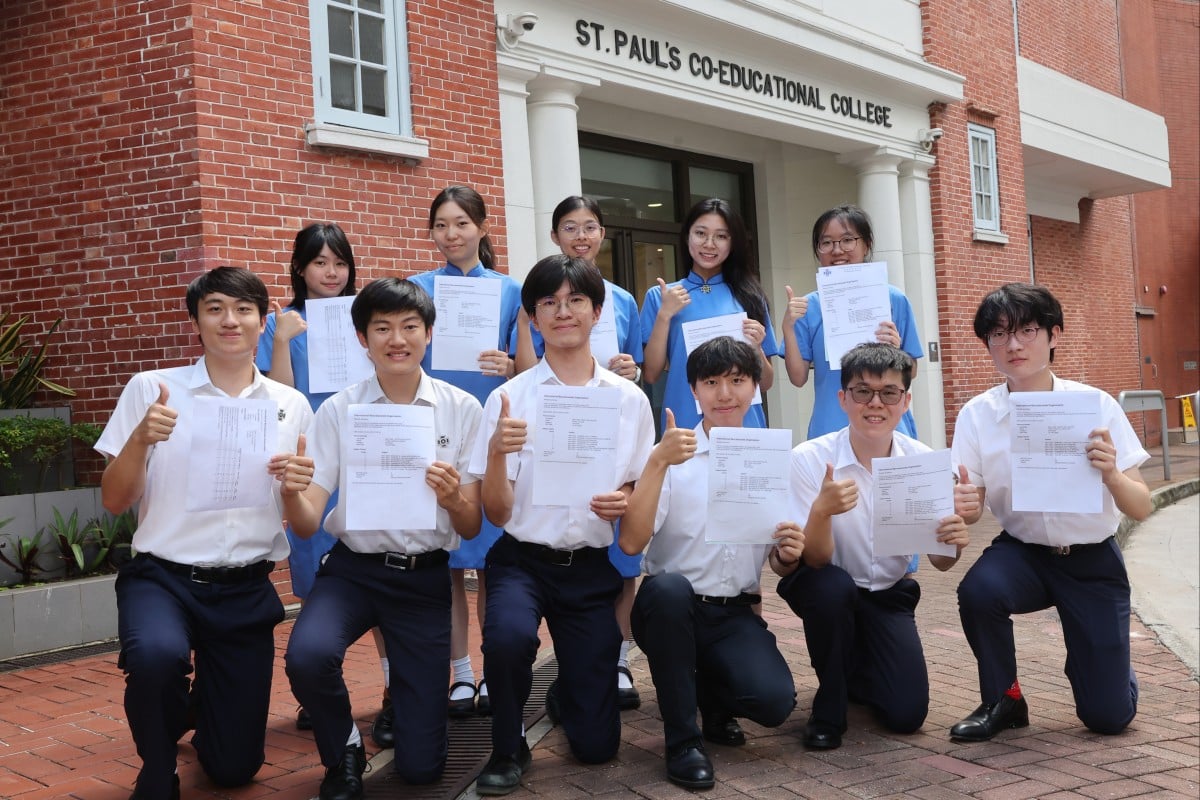 Jenson Tham (front row, second from left) from St Paul’s Co-educational College attained a perfect score on his IB exam. Photo: Edmond So
Jenson Tham (front row, second from left) from St Paul’s Co-educational College attained a perfect score on his IB exam. Photo: Edmond SoAmid a controversy over time-zone cheating, at least 32 Hong Kong students have received perfect scores in the International Baccalaureate (IB) programme this year. This is an increase from 23 in 2023.
Among the top scorers announced on Saturday were 17 pupils from the English Schools Foundation, the city’s biggest international school group.
The other students comprised four from the Diocesan Boys’ School; two each from the Victoria Shanghai Academy, Singapore International School (Hong Kong), Yew Chung International School of Hong Kong and the Independent Schools Foundation Academy; and one each from St Paul’s Co-educational College, St Stephen’s College and Po Leung Kuk Choi Kai Yau School.
According to the latest results, the number of pupils who achieved perfect scores this year had increased to 32 from the 23 logged in 2023, although the figure remained significantly lower than the 93 recorded in 2022.
A total of 2,406 students in Hong Kong took part in the IB programme this year.
International Baccalaureate body will not increase grade boundaries
Medicine continued to be one of the most popular prospective career paths for the young high-achievers.
St Paul’s Co-educational College pupil Jenson Tham, who achieved a perfect score, will head to Cambridge to study medicine and explore his interest in genetics and research.
He said he was particularly passionate about neuroscience because there would be ample room for research in the field, especially in incurable diseases.
“You can get into hands-on work to really save people and come up with new ways to try and change the landscape of healthcare and how we live [to] directly affect our quality of life,” he said.
Two of the four top scorers from the Diocesan Boys’ School said they would study medicine locally. But the other two, Bernard Shiu Yu-hin and Cyrus Wong Yuen-hei, planned to move to the United Kingdom to pursue tertiary education in politics and law, respectively.
Bernard, who will study history and politics at Cambridge University after earlier receiving a conditional offer, said he was inspired to take this direction in his studies following the storming of the US Capitol by protesters on January 6, 2021.
“It really inspired me on how irrationality can be such a powerful weapon for politicians. I don’t think learning is just for getting knowledge. To me, it’s more about solving real-life problems. Politics is the subject for [it]. And history ... [gives] a new perspective as to how we can look at politics,” he said.
Time-zone cheating scandal
This year’s IB exams grabbed headlines in May after some students were found to have leaked details about the papers on social media before candidates in other time zones sat their tests. The incidents sparked widespread outrage and calls from pupils, including Hongkongers, for tests to be cancelled or retaken.
The IB body refused to reveal how many candidates were penalised after confirming a small number of students appeared to have engaged in time-zone cheating.
Belinda Ng, IB coordinator at St Paul’s Co-educational College, said educators were “unsure” how the IB body would address time-zone cheating in the future amid its promises to look into the problem.
“They have promised to fully investigate and maybe look into splitting the time zones. Hopefully that will help mitigate some of the leaks for future cohorts and put their minds at ease that they can trust the exams,” she said.
Eleven St Paul’s Co-educational College students who achieved near-perfect scores expressed disappointment over the episode, with some describing it as “demoralising” and “an emotional blow” during the exam period.
“This incident may appear shocking and quite demoralising to be honest. But I think it’s really important for us to readjust our mentality because after all, exams are all about our mental capacity and strength,” said Jason Kuan Yuqian, who will study medicine at the University of Hong Kong.
The top students called for enhanced anti-cheating measures, such as the use of different exam papers for Asia and Europe, and stressed that pupils needed to be educated on the importance of academic integrity.
Your Voice: ‘Time zone cheating’ rocks the IB world
Leila Zak Xin-tian and Deirdre Chau Kwan-yiu, the two Victoria Shanghai Academy pupils who received top grades, called the leaks a “stressful experience”.
“It made a lot of us question whether [the exams] were really worth it to continue and why had we put so much effort into studying,” said Leila, who plans to study political science, world literature and neurobiology at Duke University in the United States.
“But I think it did make it a lot better knowing that it was a communal experience in that everyone else in our time zone was going through this. ”
Gavin Wong Yi-feng from Singapore International School, who scored 44 out of 45, said he planned to pursue computer science and biology at Yale University in the US. He was also the second runner-up in the English-language linguist category at the South China Morning Post’s Student of the Year awards in 2023.
He said this year’s cheating incidents “dominated conversations” among some IB pupils, and he had to trust the organisation’s assurance that there was no significant effect on student performance.
The IB body earlier said its investigation found that some of the examination papers uploaded online were fake and had been released by people who “intended to scam money” out of students.
The organisation said scores would remain consistent with previous years and that grade boundaries would not be increased because of the incidents.
